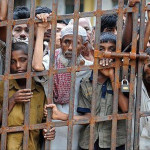“The daily physical abuse faced by Rohingya trapped on boats in the Bay of Bengal and Andaman Sea is almost too horrific to put into words”, says Amnesty Refugee and Migrant Rights Researcher, Anna Shea.
London: Rohingya Muslims, trapped on boats on the seas of Southeast Asia, suffer abuses as they seek to escape persecution in Myanmar. Amnesty International, a human rights group, has released a report titled “Deadly Journeys: The refugee and trafficking crisis in Southeast Asia” last fortnight, highlighting the inhumane conditions facing the minority Muslim group.
“The daily physical abuse faced by Rohingya trapped on boats in the Bay of Bengal and Andaman Sea is almost too horrific to put into words”, says Amnesty Refugee and Migrant Rights Researcher, Anna Shea, underlining that although many reached Indonesia after fleeing across the Andaman Sea, “they had only traded one nightmare for another”.
“The shocking truth is that those we spoke to are the ‘lucky’ ones who made it to shore, countless others perished at sea or were trafficked into forced labor situations”, Shea said.
Thailand launched an anti-trafficking crackdown in May 2015, following the discovery of dozens of bodies belonging to Rohingya and Bangladeshi migrants near the country’s southern border with Malaysia. Since then, traffickers have abandoned boats full of people at sea, leaving thousands of migrants without food, water or medical care.
“While the United Nations estimates that at least 370 people lost their lives between January and June 2015, Amnesty International believes the true figure to be much higher”, the report said. “Hundreds, if not thousands of people remain unaccounted for, and may have died during their journeys, or been sold for forced labor”.
The report also highlighted the story of a 15-year-old Rohingya girl whose father had been contacted by traffickers. “They made him listen to her cries while they beat her, and told him to pay them about $1,700”, the report said.
The report also revealed that some people tricked into forced labor were abducted in Myanmar or Bangladesh, while others were promised a safe journey to Malaysia.
“The Rohingya are so desperate that they will continue to risk their lives at sea until the root causes of this crisis are addressed. The Myanmar government must immediately end its persecution of the Rohingya”, Shea said. “Governments must ensure that initiatives against traffickers do not put people’s lives or human rights at risk, which is what happened in May 2015. They must also act quickly to implement maritime search and rescue operations”.
Amnesty urged Southeast Asian states to act immediately and “not wait for another human rights disaster at sea”.
AUTHOR: Islamic Voice
Islamic Voice is a monthly Islamic magazine published in Bangalore. It is the largest English language Muslim publication in India. It is a comprehensive magazine, places a relatively high emphasis on social issues and strives to have a broad appeal. Since 1987, Islamic Voice has covered its fascinating namesake without fear or favour, with insight, accuracy, thoroughness and a well rounded perspective on a variety of subjects - be it the economy, politics, lifestyle, the arts, entertainment, travel, science, technology or health. That's why Islamic Voice is the country's most widely read publication, a position it has held for more than a decade. And that's why it makes sense to subscribe to Islamic Voice.
We represents all Muslim sects and shades of thought from all over India. We focus on "our" triumphs which, mostly, go unreported as well as constructively addresses our failures and shortcomings.
Editor-in-Chief: A.W. Sadatullah Khan
Genre: Current Affairs associated with Muslims
Subjects Covered:
Human Rights I Analysis I Special Reports I Issues I Book Reviews I National I International I Newsmakers I Community News I Islamic Perspectives I Classifieds I Opinions
Focus articles on:
Education and Children I Inter-faith Relations I Matrimony I Muslim economy I Muslim Perspective I The Muslim world I Society I Travel I The Western viewpoint I Women in Islam
Special focus on Faith and Law:
Fiqh I Hadith I Quran


COMMENTS